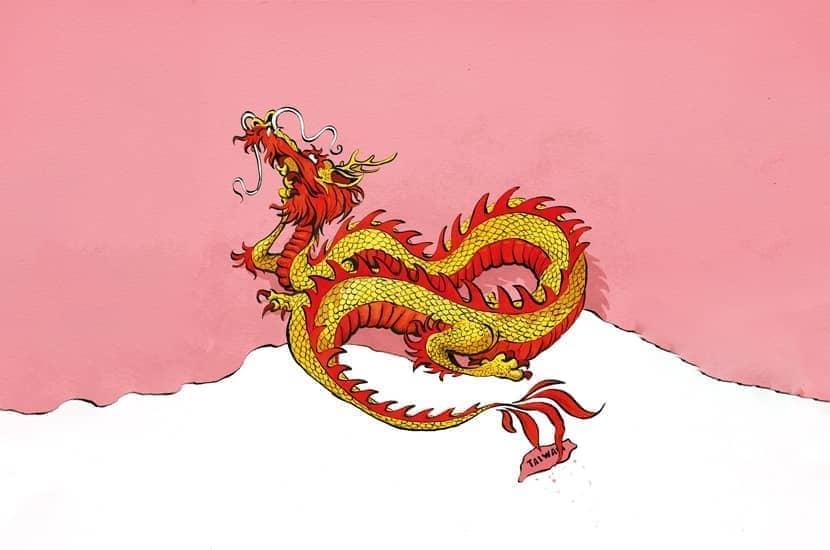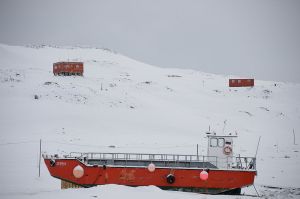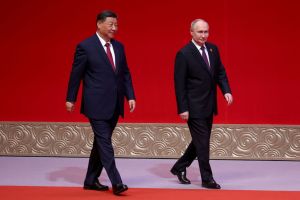This week, the central committee of the Chinese Communist Party will issue a “resolution on history.” It will enshrine the official historical narrative of the Xi Jinping era. Only two CCP leaders have issued a resolution of this kind before: Mao Zedong and Deng Xiaoping. Mao’s resolution set out his role as China’s sole leader; Deng’s, the conditions for the country’s economic focus. And Xi’s? Details are yet to be revealed, but it is expected to reinforce the idea of China’s historical destiny, what Xi calls the “great rejuvenation of the Chinese nation.” For Xi, the project of national rejuvenation is inherently linked to the reunification with Taiwan, the only part of the old republic that did not become communist in 1949. Xi has called reunification the “unswerving historical task” of the party, and he takes it very seriously. The resolution’s aim is not to celebrate the CCP’s past. It is to stress the inevitability of the future.
While westerners may find it difficult to imagine an actual invasion of Taiwan, a pressing question remains: short of open war, what levels of coercive actions are the United States and its allies willing to accept? Last month, the Chinese air force, or PLAAF, was busier than ever. Under normal circumstances, it would be customary for the Chinese military to hold national day parades to commemorate the Chinese Communist Party’s victory over the Kuomintang, the Chinese Nationalist Party, on October 1, 1949. This year was different. For five days, the PLAAF flew 150 aircraft around Taiwan. The increase in air operations in the last month suggests that Beijing has already succeeded in setting a higher threshold for international tolerance of military coercion. Incursions into Taiwanese airspace now take place on an almost daily basis. Last week, 20 Chinese warplanes entered Taiwan’s air defense zone within 24 hours.
There is growing pressure on Washington to redefine what an adequate response to Xi’s unprecedented military signaling would look like. Three weeks ago, President Joe Biden said the US would defend Taiwan if China attacked. This seemed to be a departure from America’s long-standing foreign-policy position of “strategic ambiguity.” The White House spokesman quickly clarified that the president was “not announcing any change in our policy.” It is still unclear what line will need to be crossed for the US and its allies to respond.
What would an attack on Taiwan look like? Short of an amphibious assault on the island, there are a variety of options open to China. It might try to weaken the Taiwanese economy, isolate Taiwan militarily, or break its citizens’ will to resist. Other possible scenarios include missile exercises that would prevent shipping from reaching Taiwan, the implementation of a Cuban-style quarantine, or the taking-over of Pratas and Taiping islands in the South China Sea. These would all have costs for China, but it might feel that they were acceptable. Crucially, China’s increased military activities around Taiwan are being used for tactical purposes. With every incursion, China’s air force probes Taiwan’s defense systems and gathers precious information.
In March this year, Admiral Phil Davidson, the then-head of United States Indo-Pacific Command, said it is likely there will be military action within this decade. Testifying in front of the Senate Armed Services Committee, he suggested that China’s military machine might be capable of pursuing unification by force in six years’ time. From his perspective, an invasion was not a foregone conclusion, but would soon become a realistic political option for Xi. That said, war is not likely in the very near future because the risks would be high for China. It is more conceivable that the CCP could convince the Taiwanese people it is futile to oppose reunification.
This wouldn’t be easy though. The political divide between Taiwan and mainland China only continues to grow. Last year the Taiwanese president Tsai Ing-wen was re-elected in a landslide victory on a platform that rejected the “one China principle.” In a speech last month to mark the 110th anniversary of the foundation of the Republic of China, she emphasized how Taiwan’s future must be decided in accordance with the will of its people, and that the island must resist “annexation or encroachment” upon its sovereignty. Xi, for his part, vowed in July to “smash” any attempts at formal Taiwanese independence and said he wants Taiwan to adopt a “one country, two systems” formula. President Tsai has pointed to the deterioration of freedoms in Hong Kong as evidence that Xi’s “one country, two systems” offer is unacceptable.
Polls suggest that the Taiwanese public agree with President Tsai’s approach. Regular surveys conducted by the National Chengchi University reveal that since the early 1990s, the number of people who consider themselves Taiwanese has grown steadily from a fifth to almost two-thirds of the population. Conversely, the number of those who consider themselves Chinese has dropped from 25.5 percent to a meagre 2.7 percent. Those who regard themselves as being both Taiwanese and Chinese has also dropped, from 46.4 percent in 1992 to 31.4 percent in June this year. Meanwhile the Taiwanese overwhelmingly view the US more favorably than mainland China. In China, reunification is seen only as a matter of time. In Taiwan, this is simply not the case.
For the time being, China’s strategy seems to be to break Taiwan’s will to fight, rather than outright conquest. Beijing has set out to isolate Taiwan politically, by denouncing calls for it to join the World Health Organization and by bullying Lithuania for announcing plans to host a Taiwanese representative office in Vilnius.
What can be done to push back against attempts to isolate Taiwan further? Under the Trump administration, support for President Tsai’s leadership and political agenda grew. The Taipei Act (Taiwan Allies International Protection and Enhancement Initiative) was launched in March last year and the US also increased arms sales to Taiwan. The Biden administration has continued on this path.
Last month, national security advisor Jake Sullivan said that the US would “stand up and speak out” against “fundamentally destabilizing” actions. He added that Washington would try to prevent military action against Taiwan “from ever coming to pass.” Significantly, as he made these points, American, British and Japanese naval forces were out on exercise together in the South China Sea supported by the Dutch, Canadian, and New Zealand navies. Beijing would have taken note.
The British government’s recent Integrated Review of defense and security policy (which did not mention Taiwan by name) indicated that the UK is already having to “tilt,” or recalibrate, its commitments in the Indo-Pacific region. But Britain still needs to engage more with its close partners there to assist in discouraging China from achieving its political goals.
China’s military capabilities are growing. Xi has an uncompromising timetable and more confidence to push the boundaries of what is considered permissible. He is serious about making his “resolution on history” become a reality. Is the West prepared to help stop him?
This article was originally published in The Spectator’s UK magazine. Subscribe to the World edition here.


















